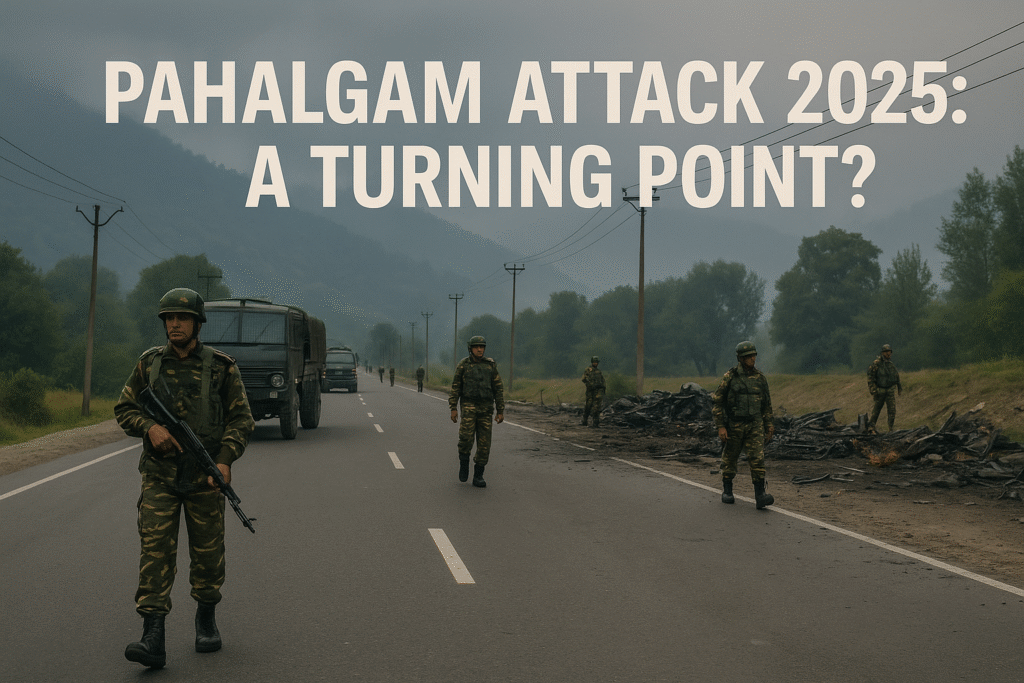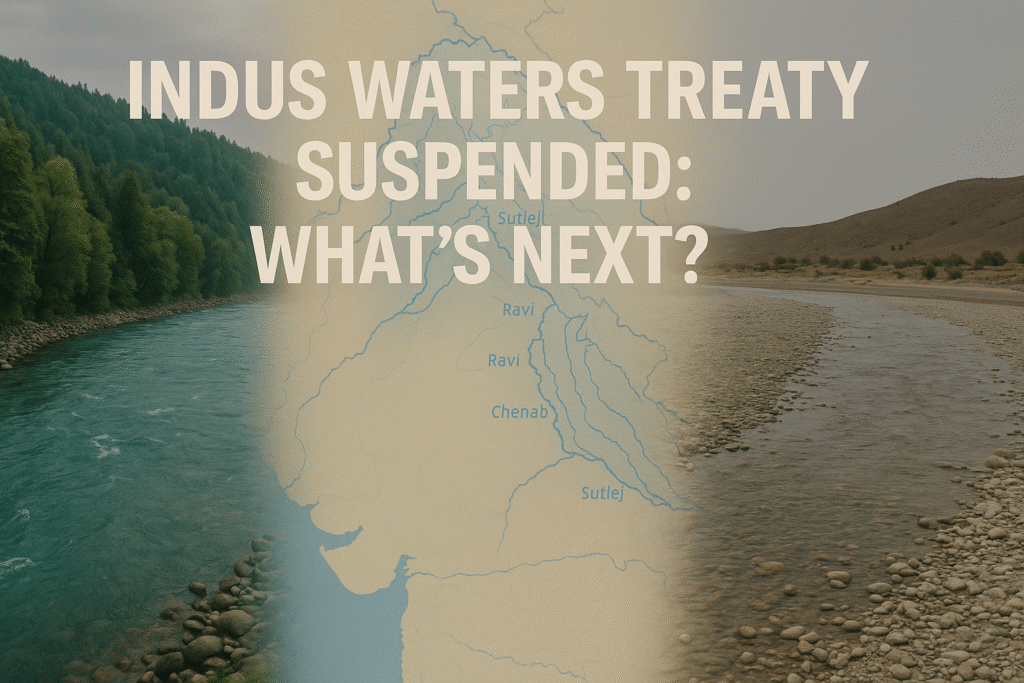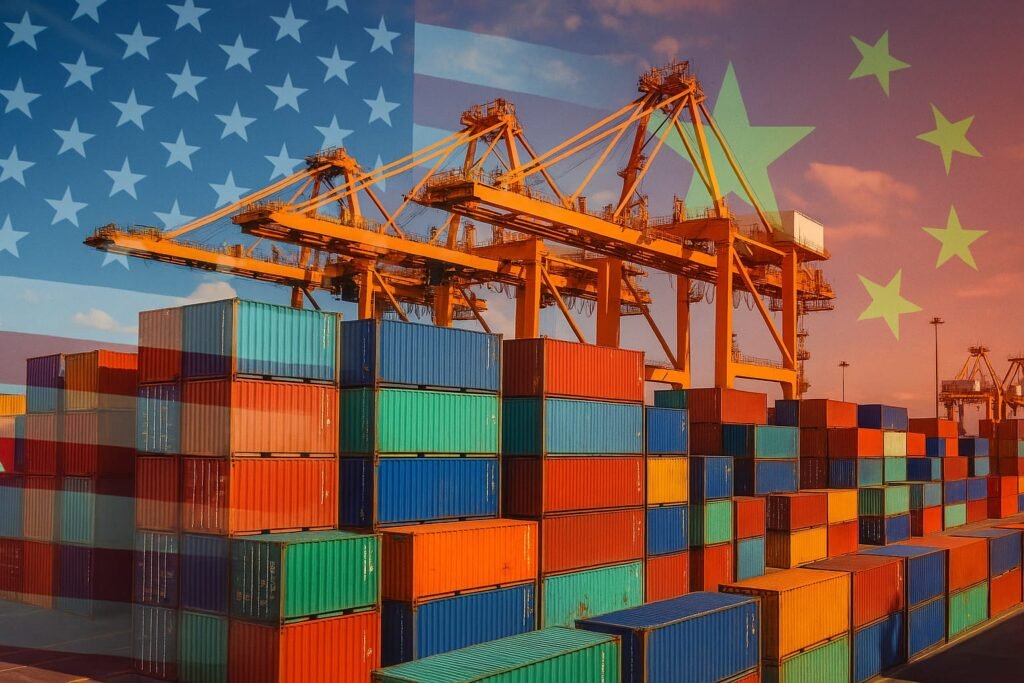Introduction: A Deadly Attack Ignites a Diplomatic Firestorm
On April 22, 2025, a horrific terror attack in Pahalgam, Jammu and Kashmir, claimed 26 lives, including 25 Indian tourists and one Nepali citizen. The Resistance Front (TRF), a shadow group of the Pakistan-based Lashkar-e-Taiba, took responsibility for the attack at Baisaran, known as “mini Switzerland” for its scenic meadows. India responded by announcing the Indus Waters Treaty suspension on April 23, 2025, a move that shocked South Asia. Pakistan called it “water warfare,” prompting significant Pakistani steps on the Indus Waters Treaty suspension. So, what are the latest updates? Let’s explore the decisions, treaty history, and regional impact. Learn more about India-Pakistan conflicts.

The History of the Indus Waters Treaty
The Indus Waters Treaty began in 1960. India and Pakistan signed it after nine years of talks, with the World Bank as the mediator. The treaty divides the Indus River system. India controls the Eastern Rivers: Ravi, Beas, and Sutlej. Pakistan manages the Western Rivers: Indus, Jhelum, and Chenab. Consequently, Pakistan gets 80% of the water—about 135 million acre-feet annually. India uses the rest for non-consumptive purposes like hydropower.
The treaty emerged after the 1947 partition. The Indus Basin was split between the two nations. India, as the upper riparian state, briefly stopped water flow to Pakistan in 1948. This led to tensions. The United Nations suggested a neutral mediator, and the World Bank stepped in. Despite wars and conflicts, the treaty held firm for over 60 years. However, the Indus Waters Treaty suspension in 2025 marks a historic shift.
For more on the treaty’s history, visit The Indian Express’s explainer.
Why Pakistan Needs the Indus Waters Treaty
Pakistan relies heavily on the Indus River system. Agriculture drives its economy, contributing 25% to its GDP. The Western Rivers irrigate Punjab and Sindh, the country’s breadbasket. About 90% of Pakistan’s irrigation depends on the Indus Basin. Additionally, hydropower from dams like Tarbela and Mangla generates a third of its electricity. Without the treaty, water shortages could devastate crops, reduce power, and worsen water scarcity. For a nation of 240 million, the treaty is a lifeline.
Pakistan’s water management is already strained. Groundwater depletion and climate change add to the challenges. Cities like Karachi rely on private tankers. Any disruption in water flow could spark food shortages and unrest. As Al Jazeera reports, water disputes between provinces like Punjab and Sindh are already a political flashpoint. Read more on Pakistan’s water crisis.
India’s Response to the Pahalgam Attack
The Indus Waters Treaty suspension was one of five major decisions taken by India on April 23, 2025. The Cabinet Committee on Security (CCS), chaired by Prime Minister Narendra Modi, met after the attack. They concluded that the attack had “cross-border linkages” to Pakistan. Here’s what India decided:
- Suspended the Indus Waters Treaty: The treaty is on hold until Pakistan stops supporting terrorism. This halts data sharing and cooperation.
- Closed the Attari-Wagah Border: This key trade route is shut. Those with valid endorsements can return by May 1, 2025.
- Banned Pakistani Nationals: Pakistani nationals must leave India within 48 hours. SAARC visa exemptions for Pakistanis are canceled.
- Expelled Diplomats: Pakistani military advisors in Delhi are declared persona non grata. India is withdrawing its advisors from Islamabad.
- Reduced Diplomatic Presence: Both nations’ high commissions will shrink from 55 to 30 personnel by May 1, 2025.
Foreign Secretary Vikram Misri stated, “The treaty will remain in abeyance until Pakistan credibly abjures its support for cross-border terrorism.” Union Home Minister Amit Shah visited Pahalgam to meet the victims’ families. Meanwhile, PM Modi vowed to “punish every terrorist and their backers” in a speech on April 24, 2025.

Pakistan’s Retaliation and Concerns
Pakistan responded on April 24, 2025, after a National Security Committee (NSC) meeting chaired by Prime Minister Shehbaz Sharif. Calling India’s move “water warfare,” Pakistan announced its own measures:
- Suspended the Shimla Agreement: Pakistan put the 1972 peace pact on hold, rejecting bilateral dispute resolution.
- Closed Airspace to Indian Airlines: Indian flights can no longer use Pakistani airspace.
- Shut Down Trade: All trade with India, which hit $1.2 billion in 2024, is suspended.
- Matched Diplomatic Cuts: Pakistan also expelled Indian advisors and reduced diplomatic staff to 30.
- Warned of War: The NSC called any water diversion an “act of war.” Foreign Minister Ishaq Dar said, “240 million people need water. You can’t stop it.”
Pakistan denies involvement in the attack. Dar dismissed India’s allegations as baseless, demanding evidence. Defence Minister Khawaja Asif warned of a “strong response” to India’s pressure tactics. Pakistan plans to challenge the treaty suspension legally, citing the World Bank’s role as mediator. For updates, check NDTV’s coverage.
Latest Updates as of April 25, 2025
As of 3:32 PM IST on April 25, 2025, tensions remain high. India formally notified Pakistan of the treaty suspension on April 24, 2025. Jal Shakti Ministry Secretary Debashree Mukherjee sent a letter to Pakistan’s Ministry of Water Resources. India also briefed ambassadors from the US, UK, and China on the attack. Home Minister Amit Shah is set to chair a meeting today to discuss the treaty suspension further.
Pakistan increased its troop presence along the Line of Control (LoC). Army Chief Gen Asim Munir ordered the 10 Corps in Rawalpindi to stay alert. Meanwhile, global leaders like Israel’s PM Netanyahu and France’s President Macron expressed solidarity with India. However, Pakistan’s Foreign Minister Dar called the attackers “freedom fighters,” escalating the rhetoric.
What’s Next for India and Pakistan?
The Indus Waters Treaty suspension could have dire consequences. For Pakistan, reduced water flow might hurt agriculture and power generation. However, India lacks the infrastructure to stop water entirely. Experts estimate India can reduce flows by 5-10%. Still, the psychological impact is significant. Pakistan may face food shortages and unrest if the situation worsens.
For India, this move pressures Pakistan on terrorism. Yet, it risks international backlash. As a downstream state on rivers like the Brahmaputra, India has upheld downstream rights. This decision might weaken that stance. Pakistan may seek World Bank intervention, but India insists the suspension is temporary. Can both nations find a way back to dialogue? Only time will tell.
Explore more on global water conflicts.
Conclusion: A Region on Edge
The Indus Waters Treaty suspension after the Pahalgam attack marks a low point in India-Pakistan relations. Both nations have taken hardline stances. The treaty, a symbol of cooperation, now hangs in the balance. What are your thoughts on this crisis? Share them below. Also, read my latest blog post on international relations: Read my latest blog post.


